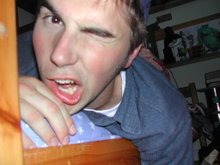Tuesday, May 8, 2007
Reduced Libertarianism and the Effects of the Other on Free Will
I've been thinking a lot about the claims of libertarian free will that one can choose to do what one wants when they want to. Although this view of human freedom appeals to me, I don't think we're able to do as it claims. First, I believe our bodies automatically do things we are hardly aware of and choose to do on a constant basis--breathe, digest, and so forth. If I concentrate on the action, I can stop breathing and defacating, but overall I do not think I consciously make a decision to breathe each time. Besides this, there are many habits that we form that may originally have been established through free will, but afterwards lack decision. For instance, I lick my tongue and say "ahh" (sounds dirty, but it isn't), after taking a gulp of any drink, but I don't consciously make this decision. These sorts of habits seem to make it more difficult to apply one's free will. The same would occur with addictions. I'm not quite sure what the difference is between a habit and an addiction, but I will have to think about it. It seems that a habit is an unconscious action one is familiar with doing, while an addiction arises in the forefront of one's mind and one struggles with its occurrence, but one is also familiar with doing it. Hence, it seems we're only able to choose what we concentrate on. Next, life is full of distractions that demand our attention and our thoughts. This could refer to television broadcasts, media, conversations and relationship with others and so forth. It seems that many of the decisions and choices that we make are often given by our interactions with the Other. This could involve one person's ability to consider and think of the salvific mission of Jesus Christ, what ethics are and how we should treat others, what is appropriate for one to eat, and so forth. Now, we do have the opportunity to turn down the others. But they seem to construct what decisions we will make in our lives. If different others in our lives than those we experience, we might have very different characters and lives. Of course, without any world or others, we could not make any decisions at all. So it seems that the more we know and experience the more decisions we are able to make, and what are able to be more free in choosing them also. Moses says something like this in Moses 1, that after experiencing what he does with Jehovah, he thinks about things he never before had supposed. Perhaps God is greatly and growingly free because he experiences and knows much and more and more than others. Of course, the veil then is seen as hugely distorting our original agency, giving a bit of a clean slate as Locke (the empiricist) said. Anyway, those are my thoughts. And I think therefore that knowledge and free will have a larger connection than we give them connection and libertarianism claims are a little too great. I promote more of a reduced libertarianism.
Subscribe to:
Post Comments (Atom)


4 comments:
Actually your ANS controls your homeostasis so the real question is whether or not one controls ones own PaNS or SyNS. I guess we chose a model complete with autopilot.
Unpack that statement, and speak in lay men's terms so dopes like me can get it. I have no idea what ANS, PaNS, or SyNS means. Model with autopilot? Don't get it. Kudos to you for having a larger understanding of this. Cheers.
I am inclined to agree with the general idea of your post, Marty. Please further define your "reduced libertarianism" if at all possible. Tell me more!
Ah yes, further defining; not easy as it seems, but I will move up to the task in time. My main concept is correlating the direct relationship between knowledge and experience with one's capacity to choose freely, but in quality and quantity of choice. I also think most knowledge and experience comes to us through the sentient Others, and internalization. I need to graft out these differences and their implications better. Thanks, I will work on this.
Post a Comment